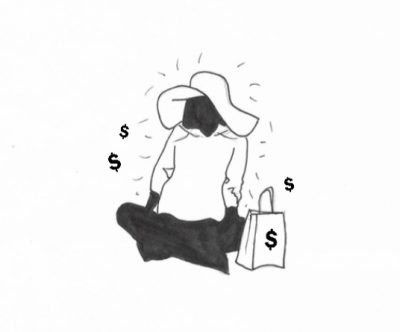Nothing is more uncomfortable than discussing money with your friends. Unfortunately, that conversation is practically inevitable. At some point, you’ll spot a friend’s meal at dinner or offer to pay for their ticket at the movies.
Reaching out to a friend about the $15 they owe you is definitely awkward, and that says a lot about our country’s culture around money — finances are an American taboo. A Wells Fargo survey found that for Americans, it’s easier to discuss death than it is finance. However, overcoming that discomfort is necessary and beneficial in recognizing our privileges.

A large part of why conversations surrounding income feel so intimidating is that Americans like to view themselves as “in the middle.” Having attended an elite prep school in New York City for the vast majority of my life, I was constantly confronted with this reality.
The majority of my classmates’ families, myself included, were in the top 5 percent of earners, yet we never felt as if that was true. After all, no one wanted to claim to be part of the upper class out loud.
At my school, we studied socioeconomic inequality, gentrification and problems with the 1 percent — that couldn’t be us, right? By ninth grade, I’d convinced myself that my income bracket was one degree lower than it actually was.
“I’m upper-middle class,” I’d say. “I work every summer. If I were upper class, I’d be able to travel just like Olivia.”
This would prompt Olivia to say something like, “Sure, we can afford a summer in Europe, but we planned that months in advance. Naomi skipped a week of school to impulsively celebrate her Sweet Sixteen in Miami. I could never afford that.”
Naomi would then respond with, “I mean, I never really go on vacation. It was the first time I traveled in years and it was my birthday. I don’t have a house in the Hamptons to throw a party in like David.”
And David would say, “My house is super nice, sure, but it’s not nearly as nice as Henry’s. His pool house is twice the size of my apartment.”
So on, and so forth. Especially in wealthy income brackets, being rich lies in the distance you create between yourself and actually being rich. Which is to say, everyone wants to be “in the middle” in order to feel as though they are deserving of their income and therefore morally good.
This attitude is dangerous, especially when it comes to recognizing where we sit socioeconomically. We must ask ourselves this: if wealthy people don’t think they’re wealthy, how will that affect their expectations of working-class Americans? What policies will they support?
In political rhetoric, there is an obsession with protecting the everyday man. He’s a hard worker with a cozy house in the suburbs, a white picket fence and a nuclear family. For centuries, we have internalized the American dream of becoming this poster child. Undoing years of such internalization is difficult and uncomfortable.
Though appealing, the “in-the-middle mindset” does more harm than good. Recognizing our privilege is the first step in making meaningful change. If enough people start being open and honest with themselves about what they can afford, we can shift culture meaningfully. It must be easier to talk about money, and that change begins with us.




